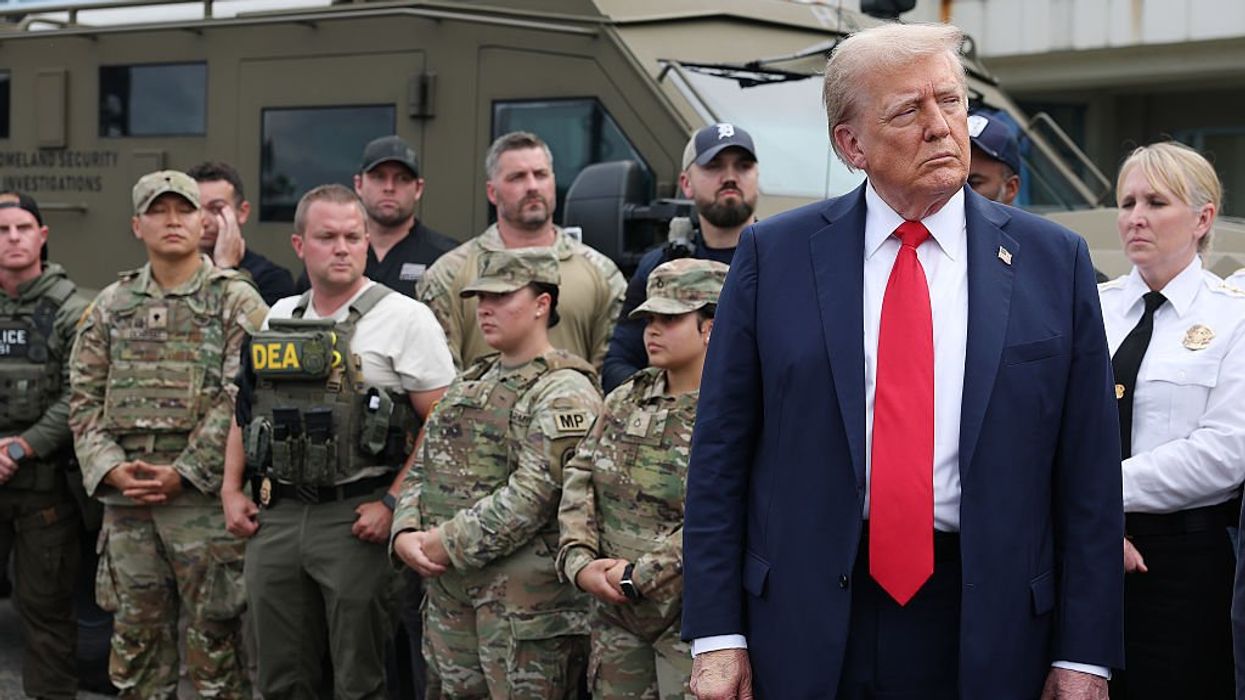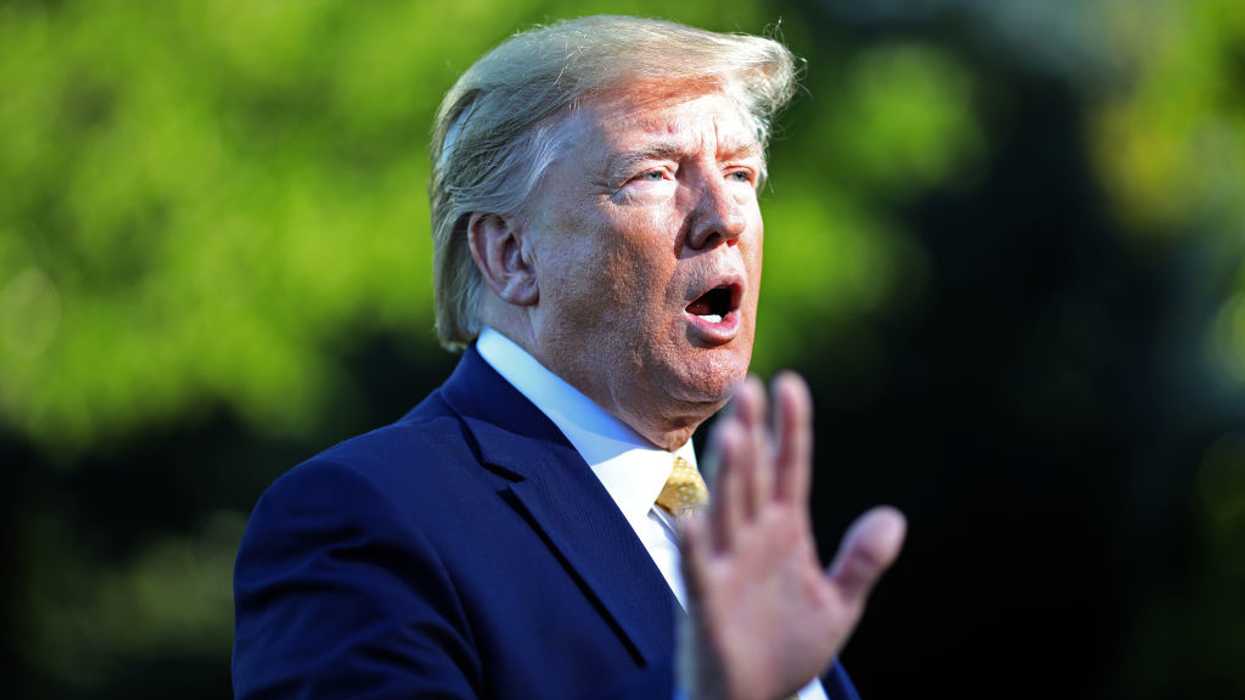Trump says his deployment of federal law enforcement is about restoring order in Washington, D.C. But the real message isn’t about crime—it’s about power. By federalizing the District’s police, activating the National Guard, and bulldozing homeless encampments with just a day’s notice, Trump is flexing a new kind of presidential muscle: the authority to override local governments at will—a move that raises serious constitutional concerns.
And now, he promises that D.C. won’t be the last. New York, Chicago, Philadelphia—cities he derides as “crime-ridden”—could be next. Noticeably absent from his list are red-state cities with higher homicide rates, like New Orleans. The pattern is clear: Trump’s law-and-order agenda is less about public safety and more about partisan punishment.
In effect, it represents a dramatic inversion of federalism and reshapes the balance of power. For over two centuries, local control over policing and public safety has been a core principle of American governance, respected by presidents of both parties. Ronald Reagan refrained from intervening in New York’s crime crisis, preferring to let state and city officials address it. Barack Obama left local officials in charge during Ferguson’s unrest in 2014. To find parallels to Trump’s approach, one must look abroad—to authoritarian leaders like Viktor Orbán in Hungary, Recep Tayyip Erdoğan in Turkey, or Vladimir Putin in Russia—where centralized crackdowns on cities are a common tactic of strongman rule.
Selective Enforcement and Political Targets
Trump’s crackdown reveals a selective pattern. Crime statistics show that some of the cities he names are not the nation’s most violent. Washington ranked fourth in homicide rates last year, while Chicago and New York were far lower. Meanwhile, St. Louis and New Orleans—both with higher homicide rates—escaped his attention. The common thread isn’t safety but partisanship: he singles out Democratic strongholds while sparing cities in red states. In doing so, Trump reframes public safety as a partisan test of loyalty rather than a matter of governance.
This is troubling because public safety has long been a shared responsibility, with local governments closest to their communities making the key decisions. By federalizing this function selectively, Trump shifts the emphasis from community safety to political punishment. Ordinary residents—people concerned about schools, housing, and neighborhood policing—become pawns in a national feud rather than citizens whose well-being is the priority.
If presidents can target opponents’ cities while ignoring allies’ failures, federalism becomes less about constitutional balance and more about partisan advantage. Even if future presidents avoid this path, the precedent itself erodes constraints on the office. Over time, that erosion can normalize the idea that cities are bargaining chips in presidential politics. Communities become pieces in a national political game, and their residents become collateral in a struggle for executive dominance.
Congress and the Erosion of Checks
Many of the same GOP voices now cheering Trump’s federalization moves once denounced far smaller assertions of executive power by Democratic presidents. Republicans railed against Barack Obama’s use of executive actions on immigration policy, such as Deferred Action for Childhood Arrivals (DACA). They also criticized Joe Biden’s attempts at student debt relief as unconstitutional overreach. The contrast underscores how partisan convenience often dictates whether lawmakers view presidential assertiveness as tyranny or necessary leadership.
What makes this shift especially dangerous is Congress’s silence. GOP lawmakers have cheered Trump’s actions as necessary to “restore order,” while Democrats have offered little resistance. By doing so, they weaken their own institution and normalize executive overreach into local functions that the Constitution never intended the presidency to control. Speaker Mike Johnson and Majority Leader Steve Scalise both praised the federalization of D.C.’s police, while Democratic opposition remained muted and fragmented.
This problem is compounded by selective enforcement. When presidents push boundaries and Congress fails to respond, temporary excesses risk becoming permanent norms. Each time Congress defers, it cedes more ground to the White House, setting a precedent that future presidents of either party can exploit. When lawmakers abandon their constitutional duty to check the executive, the balance of power tilts further toward an overmighty presidency, leaving local democracy exposed.
Consequences for Citizens and Cities
For citizens, the implications are not abstract. When federal authority displaces local control, it is ordinary residents who feel the disruption most directly. In Washington, the clearing of homeless encampments with only a day’s notice left vulnerable people scrambling for shelter and services. In cities like New York or Chicago, a federal takeover could mean policies imposed by distant officials who lack an understanding of neighborhood realities. Public safety decisions risk turning into political theater instead of policies grounded in community needs. The result is a hollowing out of local democracy, where residents lose both voice and agency in the issues closest to home.
This shift also corrodes trust. Past examples show how blurred accountability undermines confidence. During Hurricane Katrina, disputes between federal, state, and local authorities left residents uncertain who was responsible for failures in relief efforts. More recently, during the COVID-19 pandemic, conflicting state and federal directives left citizens confused about who was in charge of testing, lockdowns, and vaccine rollouts. Citizens expect local leaders—mayors, city councils, police chiefs—to be accountable for safety and services. If those responsibilities are usurped by the White House, accountability blurs. Communities may feel they have no recourse when policies are heavy-handed or ineffective, deepening cynicism about government at every level.
Conclusion: Restoring the Balance
The danger in Trump’s actions is not just what he has done in Washington but the precedent they set for the presidency itself. Once federal takeovers of local functions are normalized, the constitutional safeguards meant to protect citizens from centralized power become weaker, no matter who occupies the White House. Local democracy erodes not in a single stroke but in the steady expansion of executive authority into spaces where it does not belong.
If American democracy is to remain resilient, Congress must reassert its constitutional role. Citizens must also demand accountability. They cannot remain passive when presidents overstep. Lawmakers could start by reining in the use of executive orders, strengthening limits on emergency declarations, and clarifying boundaries for federal involvement in local policing. Courts and state governments can also reinforce limits on federal intrusion. The alternative is a presidency where cities are pawns, communities are silenced, and local self-government—the very foundation of federalism—is reduced to a relic of the past.
Robert Cropf is a professor of political science at Saint Louis University.



















Eric Trump, the newly appointed ALT5 board director of World Liberty Financial, walks outside of the NASDAQ in Times Square as they mark the $1.5- billion partnership between World Liberty Financial and ALT5 Sigma with the ringing of the NASDAQ opening bell, on Aug. 13, 2025, in New York City.
Why does the Trump family always get a pass?
Deputy Attorney General Todd Blanche joined ABC’s “This Week” on Sunday to defend or explain a lot of controversies for the Trump administration: the Epstein files release, the events in Minneapolis, etc. He was also asked about possible conflicts of interest between President Trump’s family business and his job. Specifically, Blanche was asked about a very sketchy deal Trump’s son Eric signed with the UAE’s national security adviser, Sheikh Tahnoon.
Shortly before Trump was inaugurated in early 2025, Tahnoon invested $500 million in the Trump-owned World Liberty, a then newly launched cryptocurrency outfit. A few months later, UAE was granted permission to purchase sensitive American AI chips. According to the Wall Street Journal, which broke the story, “the deal marks something unprecedented in American politics: a foreign government official taking a major ownership stake in an incoming U.S. president’s company.”
“How do you respond to those who say this is a serious conflict of interest?” ABC host George Stephanopoulos asked.
“I love it when these papers talk about something being unprecedented or never happening before,” Blanche replied, “as if the Biden family and the Biden administration didn’t do exactly the same thing, and they were just in office.”
Blanche went on to boast about how the president is utterly transparent regarding his questionable business practices: “I don’t have a comment on it beyond Trump has been completely transparent when his family travels for business reasons. They don’t do so in secret. We don’t learn about it when we find a laptop a few years later. We learn about it when it’s happening.”
Sadly, Stephanopoulos didn’t offer the obvious response, which may have gone something like this: “OK, but the president and countless leading Republicans insisted that President Biden was the head of what they dubbed ‘the Biden Crime family’ and insisted his business dealings were corrupt, and indeed that his corruption merited impeachment. So how is being ‘transparent’ about similar corruption a defense?”
Now, I should be clear that I do think the Biden family’s business dealings were corrupt, whether or not laws were broken. Others disagree. I also think Trump’s business dealings appear to be worse in many ways than even what Biden was alleged to have done. But none of that is relevant. The standard set by Trump and Republicans is the relevant political standard, and by the deputy attorney general’s own account, the Trump administration is doing “exactly the same thing,” just more openly.
Since when is being more transparent about wrongdoing a defense? Try telling a cop or judge, “Yes, I robbed that bank. I’ve been completely transparent about that. So, what’s the big deal?”
This is just a small example of the broader dysfunction in the way we talk about politics.
Americans have a special hatred for hypocrisy. I think it goes back to the founding era. As Alexis de Tocqueville observed in “Democracy In America,” the old world had a different way of dealing with the moral shortcomings of leaders. Rank had its privileges. Nobles, never mind kings, were entitled to behave in ways that were forbidden to the little people.
In America, titles of nobility were banned in the Constitution and in our democratic culture. In a society built on notions of equality (the obvious exceptions of Black people, women, Native Americans notwithstanding) no one has access to special carve-outs or exemptions as to what is right and wrong. Claiming them, particularly in secret, feels like a betrayal against the whole idea of equality.
The problem in the modern era is that elites — of all ideological stripes — have violated that bargain. The result isn’t that we’ve abandoned any notion of right and wrong. Instead, by elevating hypocrisy to the greatest of sins, we end up weaponizing the principles, using them as a cudgel against the other side but not against our own.
Pick an issue: violent rhetoric by politicians, sexual misconduct, corruption and so on. With every revelation, almost immediately the debate becomes a riot of whataboutism. Team A says that Team B has no right to criticize because they did the same thing. Team B points out that Team A has switched positions. Everyone has a point. And everyone is missing the point.
Sure, hypocrisy is a moral failing, and partisan inconsistency is an intellectual one. But neither changes the objective facts. This is something you’re supposed to learn as a child: It doesn’t matter what everyone else is doing or saying, wrong is wrong. It’s also something lawyers like Mr. Blanche are supposed to know. Telling a judge that the hypocrisy of the prosecutor — or your client’s transparency — means your client did nothing wrong would earn you nothing but a laugh.
Jonah Goldberg is editor-in-chief of The Dispatch and the host of The Remnant podcast. His Twitter handle is @JonahDispatch.